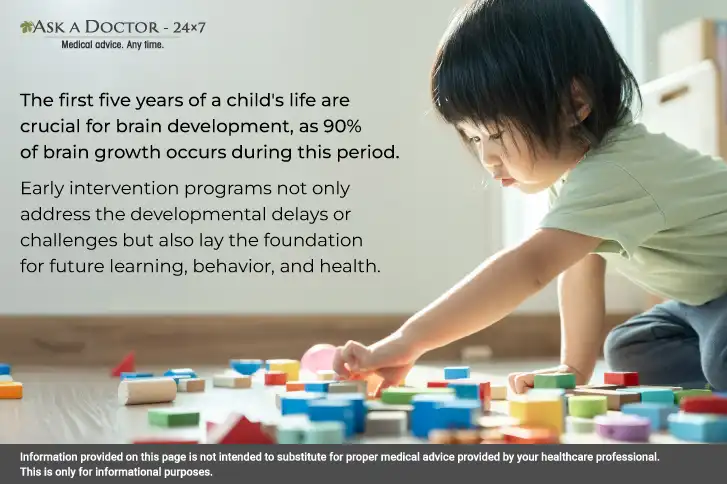Early Intervention In Neurodevelopment Disorders: Why The First 5 Years Are So Crucial?
Early intervention during early childhood is crucial for children with neurodevelopmental disorders due to the brain's increased flexibility through the first five years of life. It is all about giving children with developmental delay or disability and their families support to enable the child to meet developmental milestones and have the best possible start in life. This involves effective therapy and response to environmental stimuli. Early intervention can significantly enhance a child's developmental trajectory, yielding better outcomes in domains such as cognitive, social, and communication skills, and improving the quality of life for children and their families.
In this blog, we will discuss why early intervention is crucial for managing neurodevelopmental disorders.
Know About Early Intervention and Its Importance
Early intervention refers to the support programs and services that assist children with developmental delays, impairments, or disabilities in early childhood due to neurodevelopmental disorders like autism spectrum disorder (characterized by social, communication, and behavioral challenges), attention deficit hyperactivity disorder (persistent patterns of inattention, hyperactivity, and impulsivity), dyslexia (learning disability due to difficulty in processing language and sounds), dyscalculia(learning disability to understand numbers and mathematics), specific learning disabilities (SLD), and cerebral palsy (brain condition that affects movement and posture). Depending on the needs of the child and family, this may involve physical therapy, speech therapy, occupational therapy, and behavioral therapy. Early intervention can be provided in various settings, including the home, daycare, or specialized centers.
The benefits of early intervention include:
Better Communication Skills: Children who get early intervention can benefit from improved communication skills by addressing speech and language deficits.
Improved Social Skills: By encouraging the growth of social interaction abilities, interventions can help people build healthy connections with adults and their peers.
Improved Cognitive Outcomes: Early intervention can support the development of cognitive skills such as memory, problem-solving, and attention.
Enhanced Independence: Early interventions can help children acquire the skills needed for increased independence in various spheres of life by addressing developmental problems.
Why the First Five Years Matter the Most?

The early five years of life are a unique window of opportunity for brain, social, and emotional development. Let’s understand the importance of the first five years for brain development:
1. Rapid brain growth: The first few years of life are marked by rapid neural connection formation and strengthening, which results in intense brain growth. The brain produces a surplus of synapses, or connections between neurons, hence the best time to adapt and learn.
2, Enhanced neuroplasticity: The child is open to learning and changing at this stage. This is the perfect moment to address developmental deficits and encourage positive change because the brain is not only receptive to interventions but also extremely adaptive to therapies.
3. Foundation for future learning: Early learning skills influence academic performance, social interactions, and general quality of life. They also serve as a basis for future learning and growth.
4. Possibility of significant improvement: A child's cognitive, social, and communicative abilities may improve with early intervention, which may lessen the need for later, more involved, and expensive interventions. For example, speech therapy can assist a kid with a language delay learn how to communicate, which can help them avoid social isolation and dissatisfaction later on.
5. Positive effect on families: In addition to helping the kids, early intervention gives families resources and assistance, enabling them to better meet the needs of their children.
Areas That Require Early Intervention Strategies
Early intervention techniques often focus on four skill categories that support a child's overall development. These include social, cognitive, language and speech, and motor development.
- Motor Development: Gross and fine motor skills, including standing, holding, leaping, eating, writing, washing, and grooming.
- Communication Skills: Language and speech development are components of communication skills. These skills involve the construction of sentences, phrases, and sound vocalization.
- Cognitive Development: It encompasses the growth of perception, reasoning, and comprehension.
- Social Development: This includes forming friends, playing with other kids, and sharing possessions with fellow kids.
Conclusion
If a child has neurodevelopmental problems, early intervention is essential to improve the quality of life. A child's life development is mostly shaped during the first five years of life, as youngsters at this age will react most favorably to environmental stimuli and therapy. If a child has already been diagnosed with a disability or is at risk of developing one, it is essential to consult with medical experts, like physiotherapists, occupational therapists, dietitians, and others. They can assist in initiating the appropriate interventions for the child. Also, they can help the family deal with any special needs of the child.
If you have any questions related to early interventions in neurological development, consult a Pediatrician online at Ask a Doctor - 24x7. Also, you can check with our experts, like a Neurologist, for an expert opinion
Recently Answered Questions Related to the Importance of Early Intervention in Child Development
- How To Cure Muscle Weakness And Improve Mental Health?
- ADHD. Check On Mental Health?
- Recommend Help For Mental Health
- Suggest Medication For Mental Health
- Should I Be Worried About My Child's Physical Growth Delays?
- Suggest Treatment For Autism
- Are Developmental Delays Normal In A One Year Old Child?
- Suggest Treatment For Irregular Eating Habits In Child
- Can Early Intervention Help The Development of Chromosome 4 Disorder?
- Does Chromosome Disorder Cause Failure To Thrive?
- Suggest Treatment For Child To Improve Growth And Muscle Tone
Disclaimer: Information provided on this page is not intended to substitute for proper medical advice provided by your healthcare professional. This is only for informational purposes.
Ask a Specialist
Recent Questions


